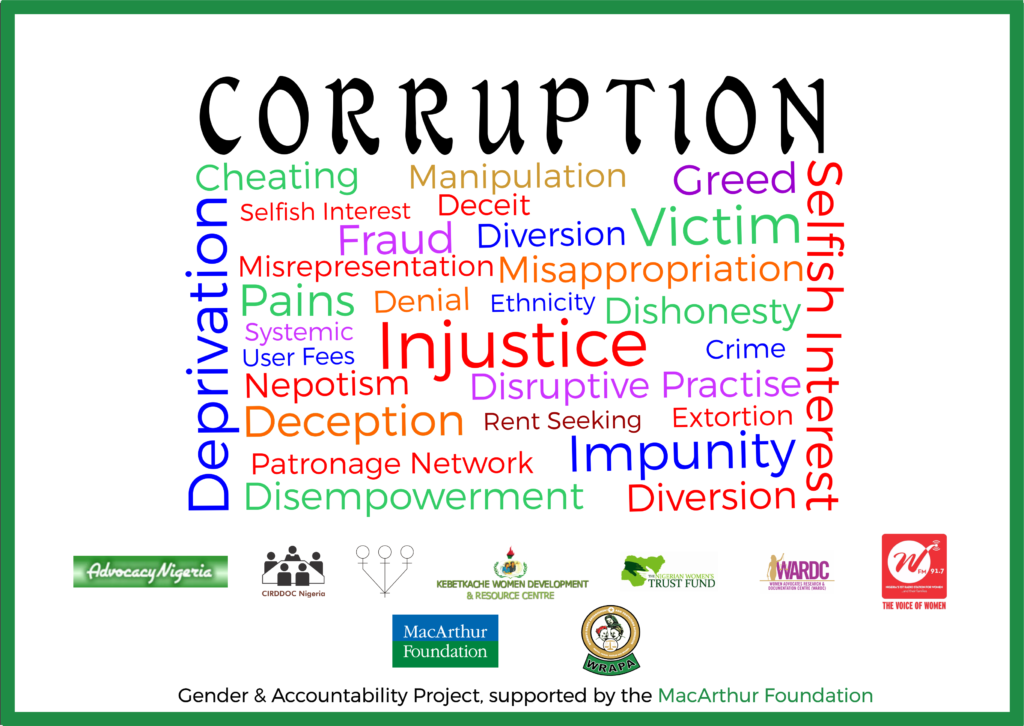MacArthur Foundation
Advocacy Nigeria, Nigerian Women Trust Fund (NWTF), Kebetkache, International Women Communication Centre (IWCC), Women Advocacy Research Documentation Centre (WARD C), Civil Resource Development and Documentation Centre (CIRDDOC) and Voice of Women FM (WFM 91.7)
Background –
Corruption is a destructive and complex trend that permeates the human, social and economic fabric of institutions and nations. The consequences however are grave due to the systemic erosion of public resources that could be deployed to the general good of all. In Nigeria, the impact of corruption has stifled growth and development depriving citizens of access to basic services, declined productivity with accentuated low personal income. These and others have become key drivers in destroying its economic and social fabric while also providing ‘legitimacy’ for persistent conflict and violence.
Justification –
Since women are more reliant on essential public services, such as delivered in health care/hospitals, education/schools, housing, food and agriculture subsidies, social services, transportation, electricity, water and waste disposal services, security (police), courts they suffer the impact of corruption disproportionately. This is because corruption creates a barrier to accessing those services when it depletes the amount of resources available and reduces the quality of public service delivery.
However, demand for accountability and anti-corruption in Nigeria does not address women’s issues as a strategic or pivotal concern. Neither does it reflect a significant contribution of women’s voices as a result of their limited economic and political power, which reduces their capacity to highlight their issues within the context of corruption. The Gender & Accountability project is an intervention necessitated by the absence of female voices in the demand for accountability, and in the fight against corruption with the support of the MacArthur Foundation.
As a result of this, WRAPA is implementing the Gender and Accountability Project, a two-year project targeted at “Institutionalizing the anti-corruption and accountability discourse reflecting women’s issues and voices.”
Aims and Objectives –
The Gender and Accountability Project is aimed at mobilizing and supporting women and women’s groups to document the cost of corruption on women, speak out against corruption, and promote anti-corruption and accountability as priority issues through traditional and social media in advance of the 2019 elections and beyond. Specifically, the objectives of the intervention are:
- To Increase the decibel of the gender voices in the anti-corruption and accountability discourse leading up to and beyond the 2019 general elections in Nigeria.
- To adopt strategies and commitments generating gender accountability that results in improved access, service delivery and inclusion in the specific issues of health, education, politics, empowerment, policy and voice.
Techniques-
WRAPA is coordinating a cohort (Gender and Accountability Cohort) comprising of seven (7) organizations namely; Advocacy Nigeria, Nigerian Women Trust Fund (NWTF), Kebetkache, International Women Communication Centre (IWCC), Women Advocacy Research Documentation Centre (WARD C), Civil Resource Development and Documentation Centre (CIRDDOC) and Voice of Women FM (WFM 91.7) to achieve the objectives of the Gender and Accountability Project. The cohort would engage in the following techniques during the course of the project:
- Baseline survey to determine the nexus between gender issues and corruption. Dissemination of findings will include the use of the social media and digital platforms of CITAD and the radio platforms of Women FM 91.7.
- Capacity enhancement for women to demand for inclusion and accountability to be designed and executed by NWTF and WARDC using the opportunity of direct access to political aspirants, candidates and electoral and governance duty bearers.
- Dialogue and interface with varied critical stakeholders to deepen impact. High level actors will be accessed through a partnership with PLAC working on the wings of activities like the Presidential debates.
- Innovative messaging and communication using traditional and new media. The G&A project will link up with CITAD Cohort for dissemination at supported scale by the Yar’adua Foundation for geographic cascading of women’s voices with accountability demand messages. Further drilling down the messages and mobilization of women’s voices at the grassroots will be achieved through the interventions of IWCC, Kebetkache, Women FM 91.7,
- Monitoring and tracking of outcomes and change champions with issue based following through commitments, pacts and their implementation by Advocacy Nigeria, IWCC, Kebetkache, and Advocacy Nigeria.
- Technical support to review, articulate policies or practice guidelines to institutionalize
accountability. WARDC and WTF in partnership with the PLAC Cohort. Women FM 91.7,
CITAD Cohort, escalating the demand for implementation will popularize the instruments
Outcomes
- A ‘Global’ context and uptake of the anti-corruption and accountability demand by an informed citizenry that is placing pressure on public officials to prioritize gender well-being and inclusion as measures of good governance.
- Critical mass of strengthened female voices demanding accountability on core gender issues as a right.
- Mechanisms are in place generating enhanced agencies and citizen capacity to monitor and enforce transparency, accountability and corruption in governance.
- Linkages between the impact of corruption and accountability and service delivery in public office more recognized and being demanded.
- Institutionalized anti-corruption response based on policy and standards for adopting candidates and measuring performance progress are established by Political parties
- Committed persons with clear plans for anti-corruption and accountability emerge with higher number of votes in elections.
- Anti-corruption and accountability form themes in the content of campaign messages.


